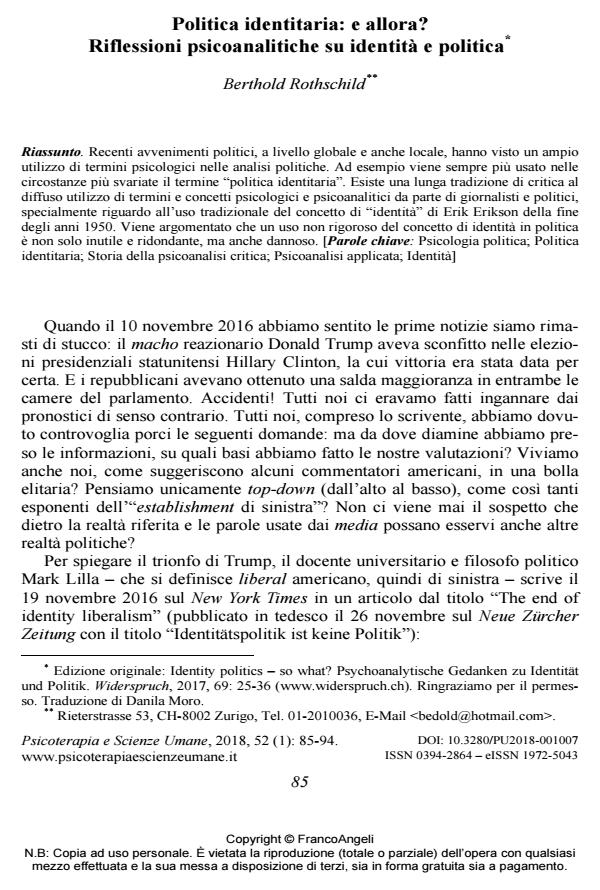Identity politics: So what? Psychoanalytic reflexions on identity and politics
Journal title PSICOTERAPIA E SCIENZE UMANE
Author/s Berthold Rothschild
Publishing Year 2018 Issue 2018/1
Language Italian Pages 10 P. 85-94 File size 79 KB
DOI 10.3280/PU2018-001007
DOI is like a bar code for intellectual property: to have more infomation
click here
Below, you can see the article first page
If you want to buy this article in PDF format, you can do it, following the instructions to buy download credits

FrancoAngeli is member of Publishers International Linking Association, Inc (PILA), a not-for-profit association which run the CrossRef service enabling links to and from online scholarly content.
Recent events in global and local politics have given space for a wider application of psychological terms in political analysis. More and more the term "identity politics" is used in the most varied circumstances. There is a long tradition of critical position against the widespread use of psychological and psychoanalytic terms and concepts by journalists and politicians, especially in the historical use of Erikson’s concept of identity of the late 1950s. It is argued that a loose application of the identity concept in politics is not only useless and redundant, but also harmful.
Keywords: Political psychology; Identity politics; History of critical psychoanalysis; Applied psychoanalysis; Identity
- Adorno T.W. (1966). Negative Dialektik. Jargon der Eigentlichkeit. Frankfurt a.M.: Suhrkamp (trad. it.: Dialettica negativa. Torino: Einaudi, 1970).
- Baier L. (1985). Unlust an der Identität. In: Gleichheitszeichen: Streitschriften über Abweichung und Identität. Berlin: Wagenbach Klaus, 1985, pp. 7-19.
- Baumann Z. (1995). Identität bedeutet immer: noch nicht. Psychologie Heute, 22, 8: 7-23.
- Binder B., Kaschuba W. & Niedermüller P., editors (2001). Inszenierung des Nationalen. Ges-chichte, Kultur und Politik der Identitäten am Ende des 20. Jahrhunderts. Köln: Böhlau (Alltag - Kultur - Wissenschaft: Beiträge zur Europäischen Ethnologie, Volume 7).
- Bopp J. (1979). Der linke Psychodrom. Kursbuch, 55: 73-96.
- Erikson E.H. (1959). Identity and the Life Cycle (Psychological Issues, 1). New York: International Universities Press (trad. it.: I cicli della vita. Continuità e mutamenti. Roma: Armando, 1991).
- Freud S. (1929 [1930]). Il disagio della civiltà. Opere, 10: 555-630. Torino: Boringhieri, 1978.
- Frischknecht J., Haffner P., Haldimann U. & Niggli P. (1976). Die unheimlichen Patrioten. Politische Reaktion in der Schweiz. Ein aktuelles Handbuch. Zürich: Limmat.
- Fukuyama F. (1992). The End of History and the Last Man. New York: Free Press (trad. it.: La fine della storia e l’ultimo uomo. Milano: Rizzoli, 1992).
- Huntington S.P. (1993). The clash of civilizations. Foreign Affairs, 72, 3: 22-49. DOI: 10.2307/20045621
- Huntington S.P. (1996). The Clash of Civilizations and the Remaking of World Order. New York: Simon & Schuster.
- Keupp H. (2013). Heraus aus der Ohnmachtsfalle: Psychologische Einmischungen. Tübingen: DGVT.
- Lilla M. (2016). The end of identity liberalism. New York Times, November 18, 2016 (www.nytimes.com/2016/11/20/opinion/sunday/the-end-of-identity-liberalism.html). Trad. tedesca: Identitätspolitik ist keine Politik. Neue Zürcher Zeitung, 26-11-2016 (www.nzz.ch/feuilleton/mark-lilla-ueber-die-krise-des-linksliberalismus-identitaetspolitik-ist-keine-politik-ld.130695).
- Leonhardt D. (2016). “Identity Politics” and its Defenders. New York Times, November 21, 2016 (www.nytimes.com/2016/11/21/opinion/identity-politics-and-its-defenders.html).
- Meyer T. (2002). Identitätspolitik: vom Missbrauch kultureller Unterschiede. Frankfurt a.M.: Suhrkamp
- Rothschild B. (1981). Selbstverwaltung und Supervision. Zeitdienst, 34/37: 281-282.
- Les défis des familles d'aujourd'hui pp.279 (ISBN:9782807330849)
- La morte di un fratello e le sue conseguenze sul funzionamento psichico familiare Massimiliano Sommantico, in INTERAZIONI 1/2019 pp.89
DOI: 10.3280/INT2019-001007 - Predicting Young Adults’ Romantic Relationship Quality: Sibling Ties and Adult Attachment Styles Massimiliano Sommantico, Anna Rosa Donizzetti, Santa Parrello, Barbara De Rosa, in Journal of Family Issues /2019 pp.662
DOI: 10.1177/0192513X18820381 - Sibling Relationships, Disability, Chronic, and Mental Illness: Development of the Siblings’ Experience Quality Scale (SEQS) Massimiliano Sommantico, Santa Parrello, Barbara De Rosa, in Journal of Developmental and Physical Disabilities /2020 pp.943
DOI: 10.1007/s10882-020-09730-4 - Italian Adaptation and Validation of the Sibling Attachment Inventory Santa Parrello, Massimiliano Sommantico, Barbara De Rosa, in Family Relations /2021 pp.1583
DOI: 10.1111/fare.12425
Berthold Rothschild, Politica identitaria: e allora? Riflessioni psicoanalitiche su identità e politica in "PSICOTERAPIA E SCIENZE UMANE" 1/2018, pp 85-94, DOI: 10.3280/PU2018-001007